Lecture 7 the printing press,

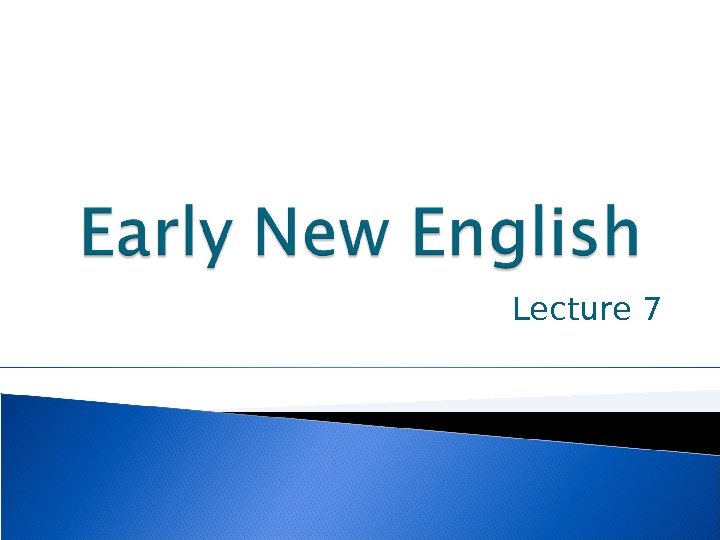
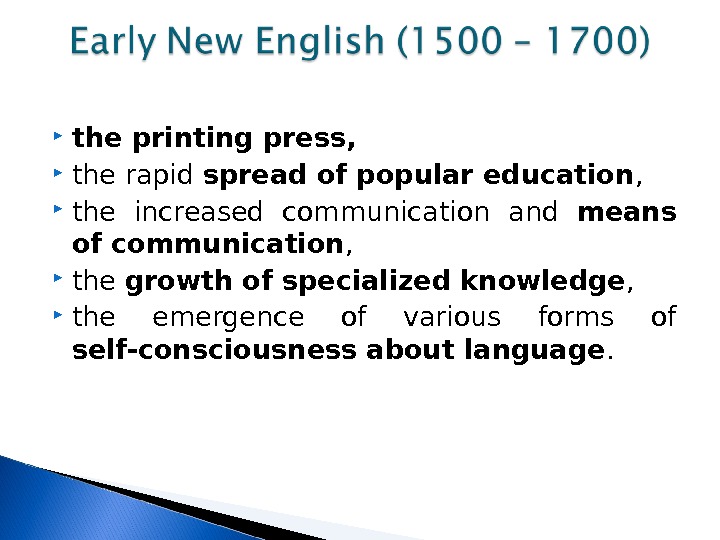
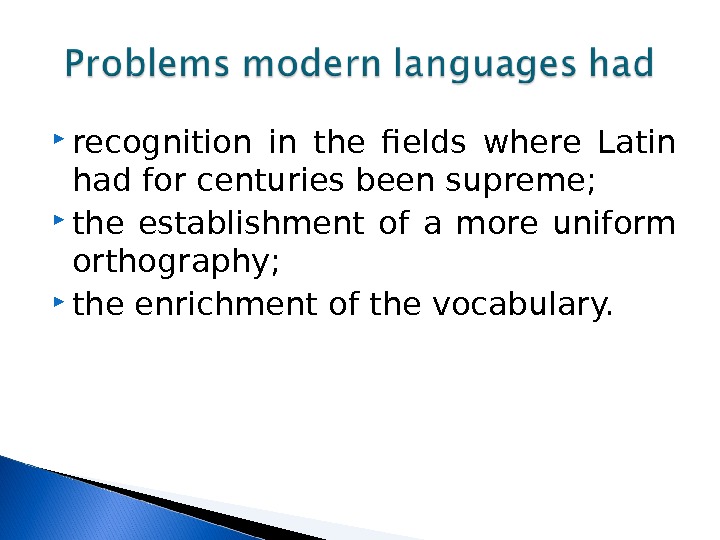
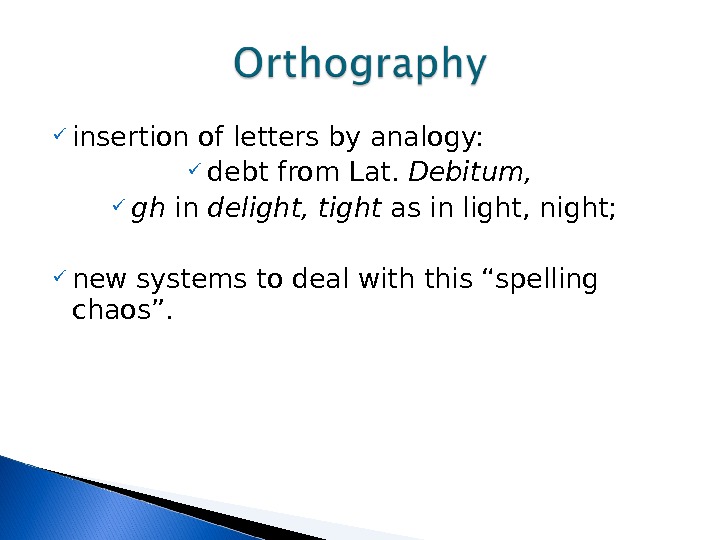
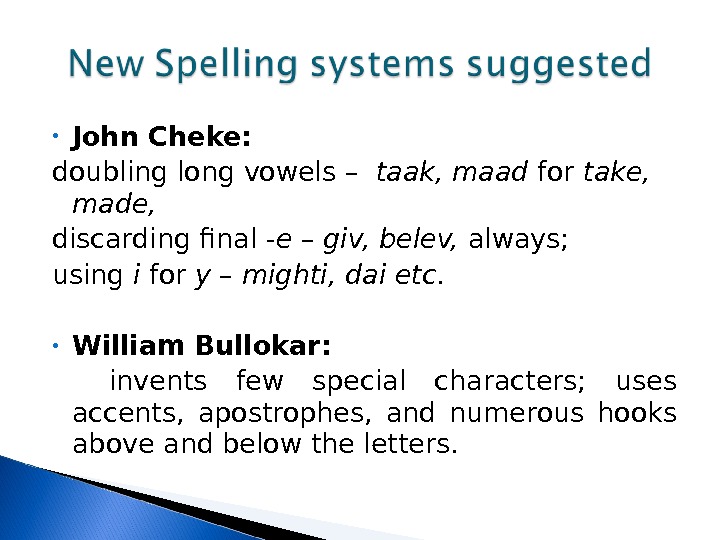
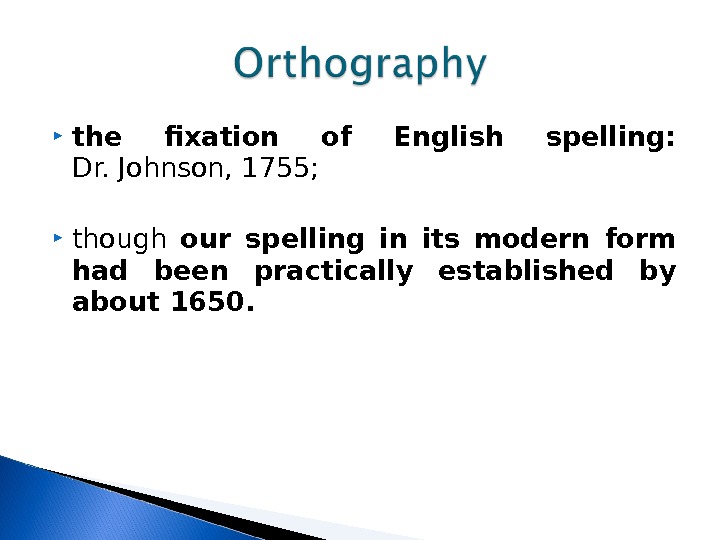
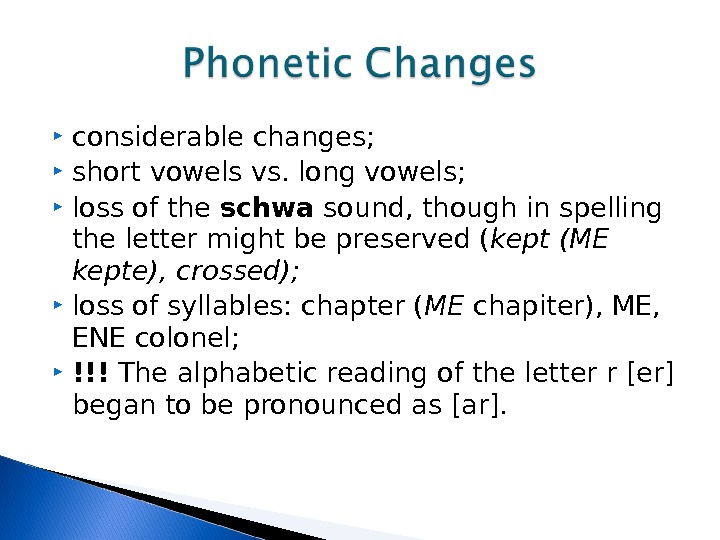
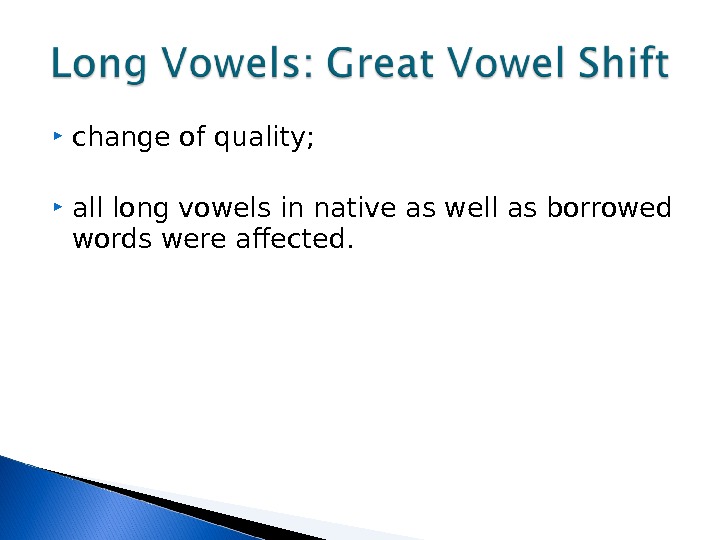
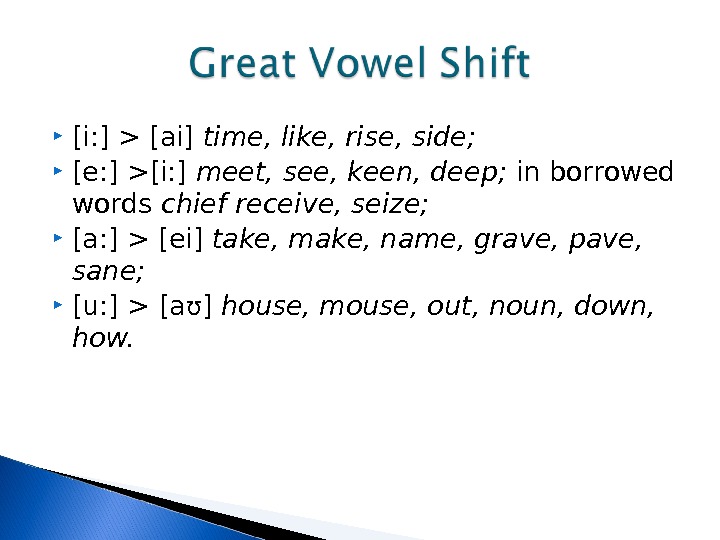
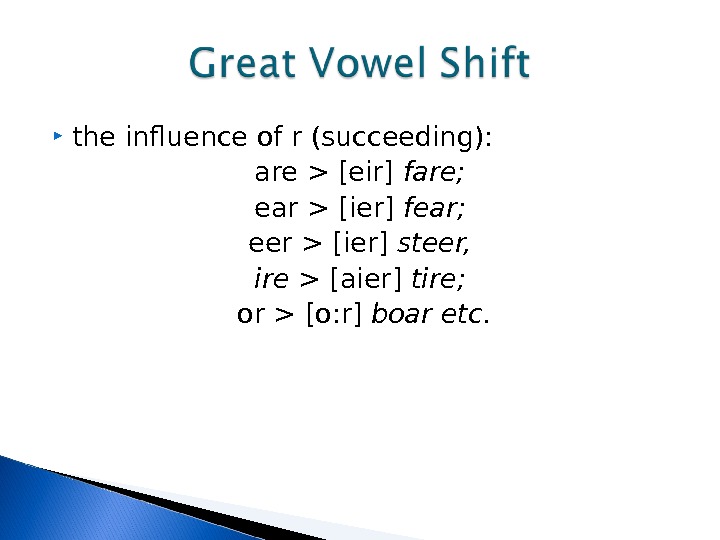
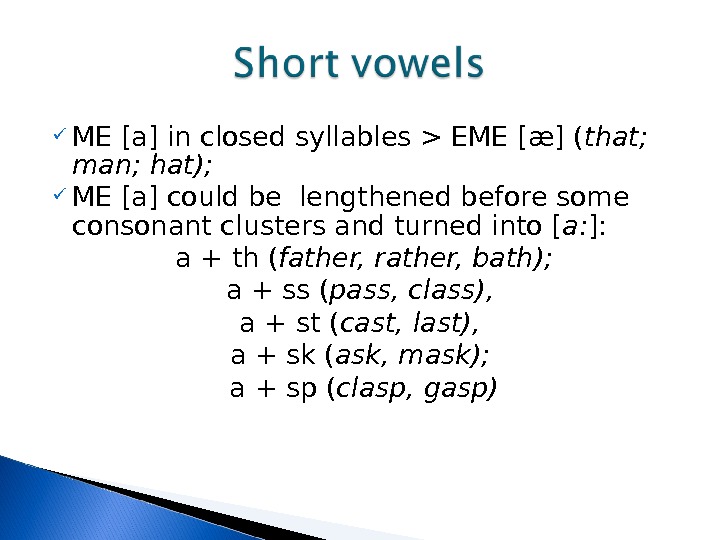
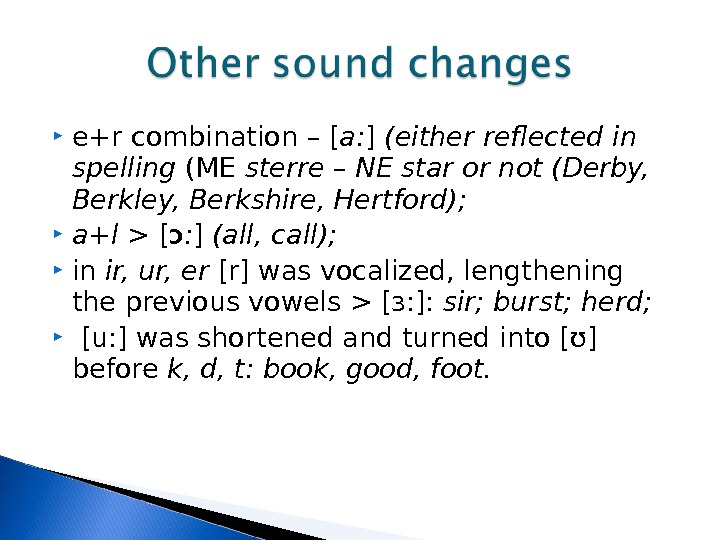
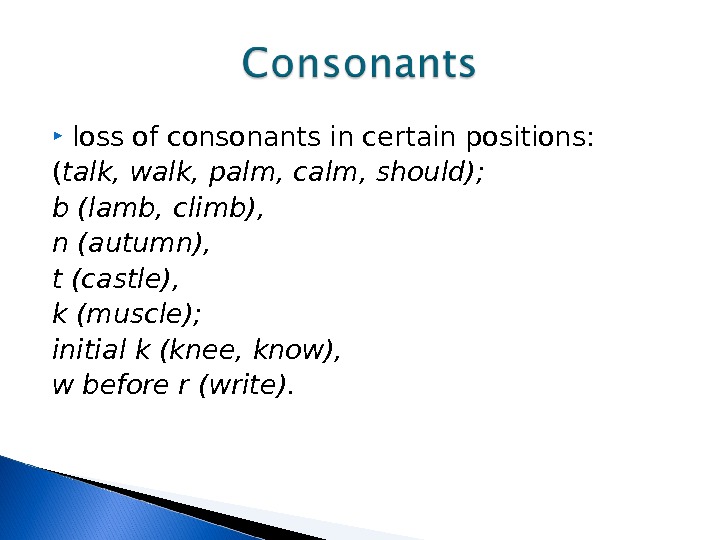
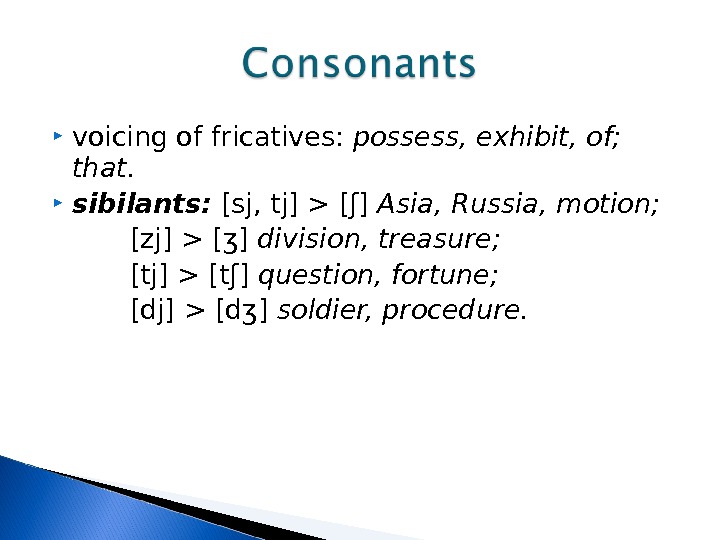
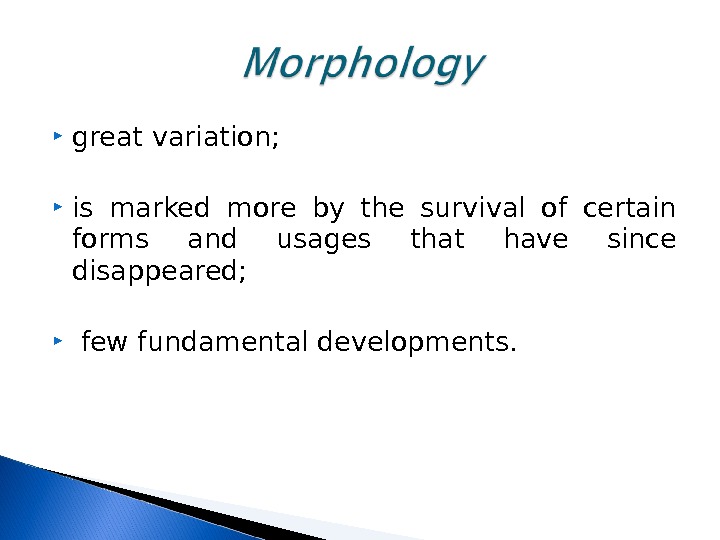
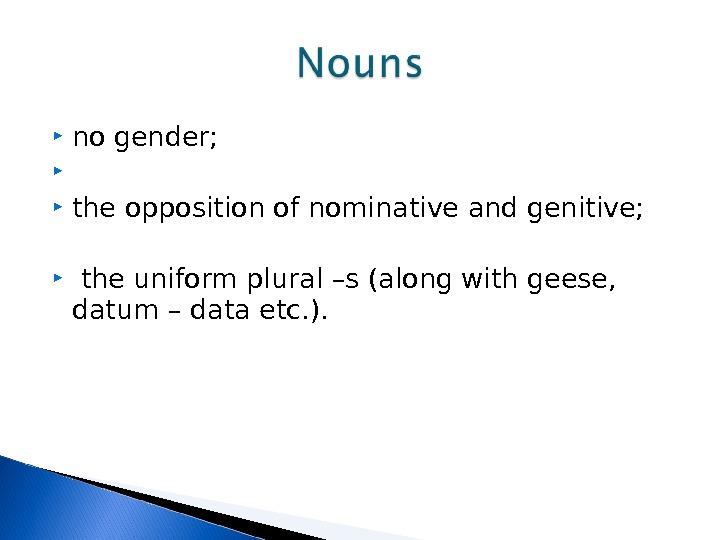
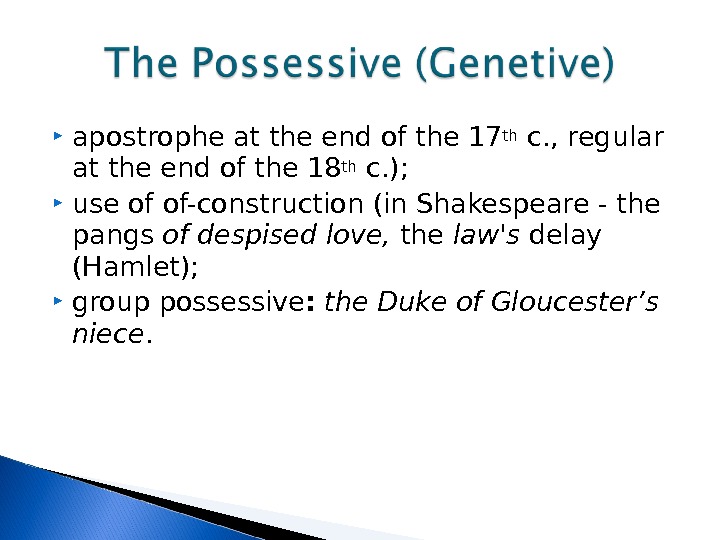
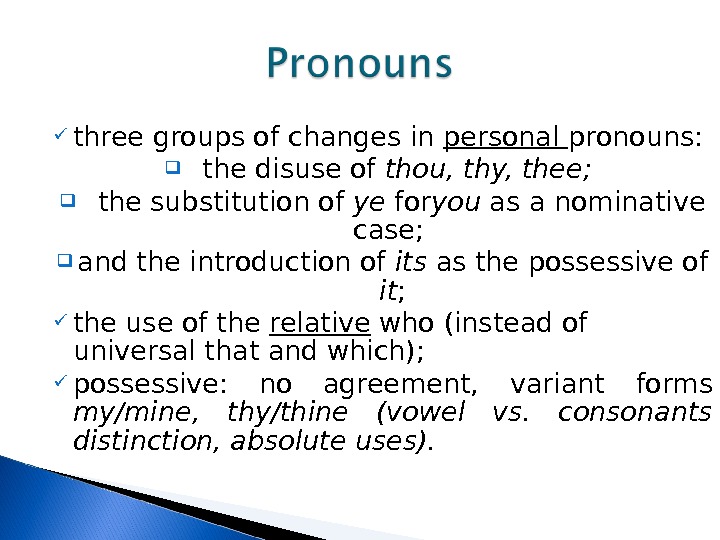

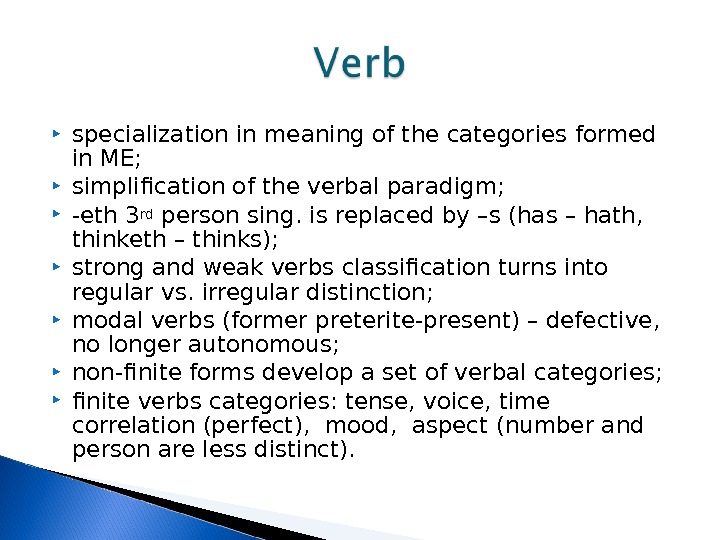
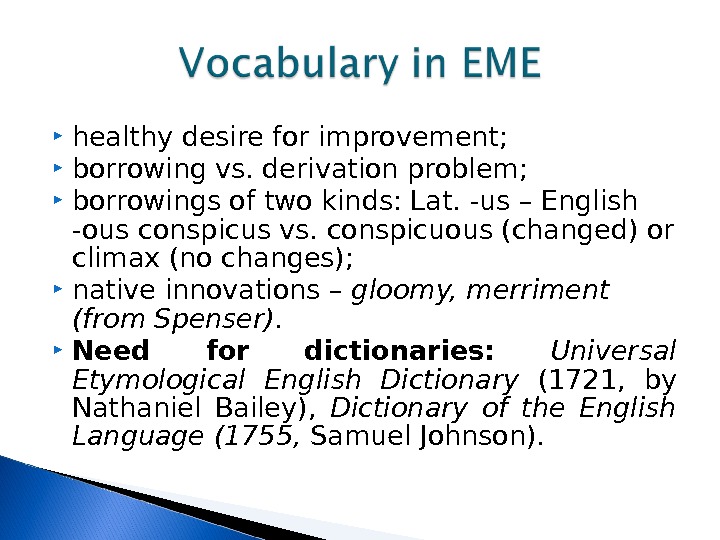
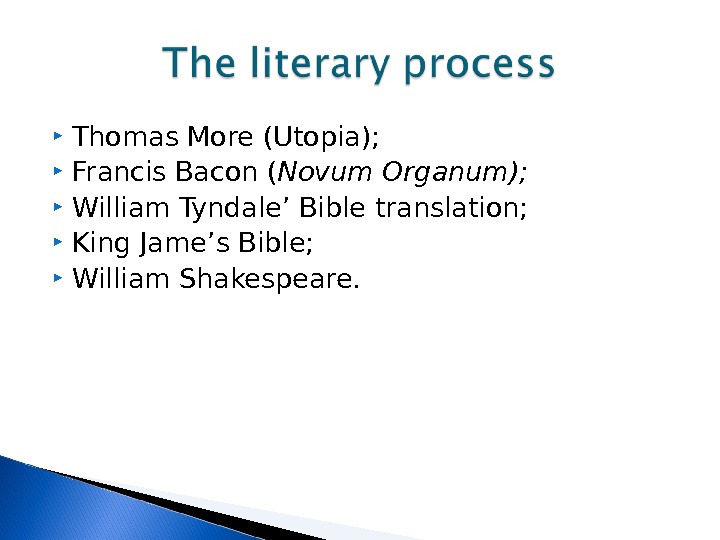
- Размер: 2.3 Mегабайта
- Количество слайдов: 22
Описание презентации Lecture 7 the printing press, по слайдам
 Lecture
Lecture
 the printing press, the rapid spread of popular education , the increased communication and means of communication , the growth of specialized knowledge , the emergence of various forms of self-consciousness about language.
the printing press, the rapid spread of popular education , the increased communication and means of communication , the growth of specialized knowledge , the emergence of various forms of self-consciousness about language.
 recognition in the fields where Latin had for centuries been supreme; the establishment of a more uniform orthography; the enrichment of the vocabulary.
recognition in the fields where Latin had for centuries been supreme; the establishment of a more uniform orthography; the enrichment of the vocabulary.
 insertion of letters by analogy: debt from Lat. Debitum, gh in delight, tight as in light, night; new systems to deal with this “spelling chaos”.
insertion of letters by analogy: debt from Lat. Debitum, gh in delight, tight as in light, night; new systems to deal with this “spelling chaos”.
 • John Cheke: doubling long vowels – taak, maad for take, made, discarding final — e – giv, belev, always; using i for y – mighti, dai etc. • William Bullokar: invents few special characters; uses accents, apostrophes, and numerous hooks above and below the letters.
• John Cheke: doubling long vowels – taak, maad for take, made, discarding final — e – giv, belev, always; using i for y – mighti, dai etc. • William Bullokar: invents few special characters; uses accents, apostrophes, and numerous hooks above and below the letters.
 the fixation of English spelling: Dr. Johnson, 1755; though our spelling in its modern form had been practically established by about 1650.
the fixation of English spelling: Dr. Johnson, 1755; though our spelling in its modern form had been practically established by about 1650.
 considerable changes; short vowels vs. long vowels; loss of the schwa sound, though in spelling the letter might be preserved ( kept (ME kepte), crossed); loss of syllables: chapter ( ME chapiter), ME, ENE colonel; !!! The alphabetic reading of the letter r [er] began to be pronounced as [ar].
considerable changes; short vowels vs. long vowels; loss of the schwa sound, though in spelling the letter might be preserved ( kept (ME kepte), crossed); loss of syllables: chapter ( ME chapiter), ME, ENE colonel; !!! The alphabetic reading of the letter r [er] began to be pronounced as [ar].
 change of quality; all long vowels in native as well as borrowed words were affected.
change of quality; all long vowels in native as well as borrowed words were affected.
![[i: ] [ai] time, like, rise, side; [e: ] [i: ] meet, see, [i: ] [ai] time, like, rise, side; [e: ] [i: ] meet, see,](/docs//early_new_english_images/early_new_english_8.jpg) [i: ] > [ai] time, like, rise, side; [e: ] >[i: ] meet, see, keen, deep; in borrowed words chief receive, seize; [a: ] > [ei] take, make, name, grave, pave, sane; [u: ] > [a ʊ ] house, mouse, out, noun, down, how.
[i: ] > [ai] time, like, rise, side; [e: ] >[i: ] meet, see, keen, deep; in borrowed words chief receive, seize; [a: ] > [ei] take, make, name, grave, pave, sane; [u: ] > [a ʊ ] house, mouse, out, noun, down, how.
![the influence of r (succeeding): are [eir] fare; ear [ier] fear; the influence of r (succeeding): are [eir] fare; ear [ier] fear;](/docs//early_new_english_images/early_new_english_9.jpg) the influence of r (succeeding): are > [eir] fare; ear > [ier] fear; eer >[ier] steer, ire > [aier] tire; or > [o: r] boar etc.
the influence of r (succeeding): are > [eir] fare; ear > [ier] fear; eer >[ier] steer, ire > [aier] tire; or > [o: r] boar etc.
![ME [a] in closed syllables EME [æ] ( that; man; hat); ME ME [a] in closed syllables EME [æ] ( that; man; hat); ME](/docs//early_new_english_images/early_new_english_10.jpg) ME [a] in closed syllables > EME [æ] ( that; man; hat); ME [a] could be lengthened before some consonant clusters and turned into [ a: ]: a + th ( father, rather, bath); a + ss ( pass, class), a + st ( cast, last), a + sk ( ask, mask); a + sp ( clasp, gasp)
ME [a] in closed syllables > EME [æ] ( that; man; hat); ME [a] could be lengthened before some consonant clusters and turned into [ a: ]: a + th ( father, rather, bath); a + ss ( pass, class), a + st ( cast, last), a + sk ( ask, mask); a + sp ( clasp, gasp)
![e+r combination – [ a: ] (either reflected in spelling (ME sterre – NE star e+r combination – [ a: ] (either reflected in spelling (ME sterre – NE star](/docs//early_new_english_images/early_new_english_11.jpg) e+r combination – [ a: ] (either reflected in spelling (ME sterre – NE star or not (Derby, Berkley, Berkshire, Hertford); a+l > [ Ɔ : ] (all, call); in ir, ur, er [r] was vocalized, lengthening the previous vowels > [ ɜ: ]: sir; burst; herd; [u: ] was shortened and turned into [ ʊ ] before k, d, t: book, good, foot.
e+r combination – [ a: ] (either reflected in spelling (ME sterre – NE star or not (Derby, Berkley, Berkshire, Hertford); a+l > [ Ɔ : ] (all, call); in ir, ur, er [r] was vocalized, lengthening the previous vowels > [ ɜ: ]: sir; burst; herd; [u: ] was shortened and turned into [ ʊ ] before k, d, t: book, good, foot.
 loss of consonants in certain positions: ( talk, walk, palm, calm, should); b (lamb, climb), n (autumn), t (castle), k (muscle); initial k (knee, know), w before r (write).
loss of consonants in certain positions: ( talk, walk, palm, calm, should); b (lamb, climb), n (autumn), t (castle), k (muscle); initial k (knee, know), w before r (write).
![voicing of fricatives: possess, exhibit, of; that. sibilants: [sj, tj] voicing of fricatives: possess, exhibit, of; that. sibilants: [sj, tj]](/docs//early_new_english_images/early_new_english_13.jpg) voicing of fricatives: possess, exhibit, of; that. sibilants: [sj, tj] > [ ʃ] Asia, Russia, motion; [zj] > [ʒ] division, treasure; [tj] > [t ʃ ] question, fortune; [dj] > [d ʒ ] soldier, procedure.
voicing of fricatives: possess, exhibit, of; that. sibilants: [sj, tj] > [ ʃ] Asia, Russia, motion; [zj] > [ʒ] division, treasure; [tj] > [t ʃ ] question, fortune; [dj] > [d ʒ ] soldier, procedure.
 great variation; is marked more by the survival of certain forms and usages that have since disappeared; few fundamental developments.
great variation; is marked more by the survival of certain forms and usages that have since disappeared; few fundamental developments.
 no gender; the opposition of nominative and genitive; the uniform plural –s (along with geese, datum – data etc. ).
no gender; the opposition of nominative and genitive; the uniform plural –s (along with geese, datum – data etc. ).
 apostrophe at the end of the 17 th c. , regular at the end of the 18 th c. ); use of of-construction (in Shakespeare — the pangs of despised love, the law’s delay (Hamlet); group possessive : the Duke of Gloucester’s niece.
apostrophe at the end of the 17 th c. , regular at the end of the 18 th c. ); use of of-construction (in Shakespeare — the pangs of despised love, the law’s delay (Hamlet); group possessive : the Duke of Gloucester’s niece.
 three groups of changes in personal pronouns: the disuse of thou, thy, thee; the substitution of ye for you as a nominative case; and the introduction of its as the possessive of it ; the use of the relative who (instead of universal that and which); possessive: no agreement, variant forms my/mine, thy/thine (vowel vs. consonants distinction, absolute uses).
three groups of changes in personal pronouns: the disuse of thou, thy, thee; the substitution of ye for you as a nominative case; and the introduction of its as the possessive of it ; the use of the relative who (instead of universal that and which); possessive: no agreement, variant forms my/mine, thy/thine (vowel vs. consonants distinction, absolute uses).
 no agreement with the noun; loss of mutation in many cases; differentiation of meaning for elder/older, further/farther; analytical formations and synthetic means are still interchangeable: most sharp and violentest (from Shakespeare); use of double comparatives and superlatives (more wider).
no agreement with the noun; loss of mutation in many cases; differentiation of meaning for elder/older, further/farther; analytical formations and synthetic means are still interchangeable: most sharp and violentest (from Shakespeare); use of double comparatives and superlatives (more wider).
 specialization in meaning of the categories formed in ME; simplification of the verbal paradigm; -eth 3 rd person sing. is replaced by –s (has – hath, thinketh – thinks); strong and weak verbs classification turns into regular vs. irregular distinction; modal verbs (former preterite-present) – defective, no longer autonomous; non-finite forms develop a set of verbal categories; finite verbs categories: tense, voice, time correlation (perfect), mood, aspect (number and person are less distinct).
specialization in meaning of the categories formed in ME; simplification of the verbal paradigm; -eth 3 rd person sing. is replaced by –s (has – hath, thinketh – thinks); strong and weak verbs classification turns into regular vs. irregular distinction; modal verbs (former preterite-present) – defective, no longer autonomous; non-finite forms develop a set of verbal categories; finite verbs categories: tense, voice, time correlation (perfect), mood, aspect (number and person are less distinct).
 healthy desire for improvement; borrowing vs. derivation problem; borrowings of two kinds: Lat. -us – English -ous conspicus vs. conspicuous (changed) or climax (no changes); native innovations – gloomy, merriment (from Spenser). Need for dictionaries: Universal Etymological English Dictionary (1721, by Nathaniel Bailey), Dictionary of the English Language (1755, Samuel Johnson).
healthy desire for improvement; borrowing vs. derivation problem; borrowings of two kinds: Lat. -us – English -ous conspicus vs. conspicuous (changed) or climax (no changes); native innovations – gloomy, merriment (from Spenser). Need for dictionaries: Universal Etymological English Dictionary (1721, by Nathaniel Bailey), Dictionary of the English Language (1755, Samuel Johnson).
 Thomas More (Utopia); Francis Bacon ( Novum Organum); William Tyndale’ Bible translation; King Jame’s Bible; William Shakespeare.
Thomas More (Utopia); Francis Bacon ( Novum Organum); William Tyndale’ Bible translation; King Jame’s Bible; William Shakespeare.

